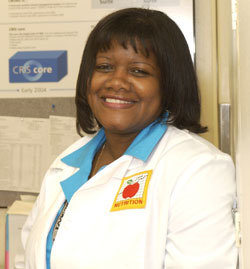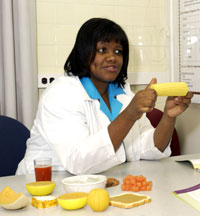 |
 |

|
|
Antoinette Colbert, B.S., Registered Dietetic Technician (RDT), Clinical Center, National Institutes of Health, Bethesda, Maryland
|
1. I chose this career because...
2. My typical workday involves...
3. What I like best and least about my work...
4. My career goals...
5. When I'm not working, I like to...
|
|
1. I chose this career because...
|
Back to Top

|

|
|
Antoinette teaches a patient about proper nutrition and healthy eating habits.
|
I chose to become a registered dietetic technician during my career exploration in high school. When I was 16, my mother took me to a nursing home to seek a job and explore the field of nursing. There were no openings as a nurse’s assistant, but there was an available position in the nutrition department. While working with the dietician there, I became very interested in the field. I soon realized that good nutrition had a lot to do with a person’s well being. Because of my experiences there, I knew that working in nutrition was what I wanted to do.
Education
- Associate of Arts, Dietetic Technician, Montgomery College, Silver Spring, Maryland
- Associate of Arts, Health Management, Montgomery College, Silver Spring, Maryland
- Bachelor of Science, Health Management, University of Maryland, College Park, Maryland
Two Great Mentors
One great mentor was my professor at Montgomery College. She noticed that I took initiative. For example, though I lived far away from campus, I was usually the first to arrive for class. Since she lived near me, she offered to give me a ride. She was honest and knowledgeable, and gave me insight into the field of nutrition. We became good friends and remained friends for a long time.
Another great mentor was the department coordinator for my Associate of Arts program at Montgomery College. She was almost like a mother to me and took me under her wing. She advised me about what classes to take, and explained how both clinical and management training make for a more flexible and satisfying career. I see now that she was right, and I appreciate her great foresight.
Work Experience
While at Montgomery College, I completed an internship at two different nursing homes in Silver Spring, Maryland, as part of the program requirements. After finishing my first Associate of Arts degree, I went to work for the National Naval Medical Center in Bethesda, Maryland. Then I worked at Walter Reed Army Medical Center for the next 13 years. It was a great experience, and many people helped me. I started doing tech work under supervision and later was able to work independently. Eventually, I felt that my potential for personal and financial growth was limited. That’s when I decided to go back to school and get my Bachelor of Science. degree. I chose health management because it tied in with my work experience.
|
|
2. My typical workday involves...
|
Back to Top

|
My typical workday revolves around my patient care and management duties.
Major clinical (patient care) duties include:
- Assessing new patients to plan patient care. We retrieve information from our computer database about their health status and determine the level of care they need. They may see a technician or require intervention by a registered dietician.
- Managing patient care. If the assessment indicated a technician-level intervention, we manage their nutrition care while they are at the clinical center.
- Documenting all patient intervention and data in our computerized MIS (management information system). This includes recording patient allergies, special diets, and tracking room service orders.
- Educating patients about possible drug and nutrient interactions.
- Assisting registered dieticians with patient care or clinical studies. For example, we have done clinical studies on calcium and vitamin C.
- Participating in regular in-service training to keep updated in the field.
Major management (room service) duties include:
- Managing room service for all clinical patients. We act as a liaison between the food service manager and the dietician. For example, if a tray doesn’t arrive at a patient’s room, we track what happened and alleviate the problem.
- Documenting customer service details in the Management Information System.
|
|
|
 |